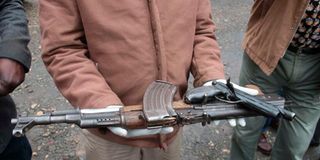Outlaw private gun ownership

Police at Karatina police station in Nyeri county display an AK47 rifle and a homemade pistol which were recovered in Karatina town on May 12, 2019.
What you need to know:
- This is the first election where guns were used openly to threaten opponents.
- Sadly, political parties have remained silent on gun incidents involving their members.
- Kenyan politics has attracted people who otherwise should be in jail than in the public office.
The fatal shooting of an aide in Kimilili, allegedly at the hands of local MP Didmus Barasa, was to be expected in a country now awash with more guns in private hands, whether licensed or illegally acquired.
Nothing would have stopped another death as previous culprits are yet to face justice years later.
Mr Barasa is not the first politician to be accused of abusing a firearm in this way.
Embakasi East MP Babu Owino reportedly shot a DJ at close range in a nightclub. DJ Evolve is now paraplegic, requiring specialist care.
Another gun incident, involving Aisha Jumwa, a former Woman Rep of Kilifi, and her aide, ended in the death of the victim.
These cases are dragging in court. The Office of the Director of Public Prosecutions has demanded the file on Mr Barasa’s gun incident but I—and, perhaps, many other Kenyans—will not hold my breath that justice will ever be served.
Politicians have always been treated with kid gloves and any criminal matter involving them or their kin is hardly ever punished.
The copycat effect of abuse of firearms by politicians and, indeed, the police, has led to the proliferation of illegal guns in towns and cities across the country.
This was something only attributable to troubled towns in the north, where cattle rustling is common. Drive-by shootings that we only saw in movies have become part of Kenyan culture. Business deals gone sour are now resolved by gunfights and not courts.
This is the first election where guns were used openly to threaten opponents.
A political aspirant in Tudor, Mombasa, suffered serious gunshot wounds with life-changing injuries. The gun battle at a tallying centre in Eldas, Wajir, on the eve of the polls, was reminiscent of a war zone.
Sadly, political parties have remained silent on gun incidents involving their members.
In the latest incident, all political parties—and not just Deputy President William Ruto’s UDA, of which Barasa is a member—should have condemned the act.
Election-related gun violence
Parties tend to divorce themselves from injustices that befall the mwananchi or issues of criminal nature involving their members.
They should be taking responsibility and working with criminal justice agencies to flush out goons within their parties masquerading as politicians.
It’s not just about the votes. Security matters are just as important and should be the responsibility of everyone, particularly the political parties when it comes to election-related gun violence. They have social responsibility like any other entity.
Kenyan politics has attracted people who otherwise should be in jail than in the public office.
These people have exhibited thuggish behaviour, which political parties and voters have condoned.
It’s not surprising, therefore, that use and abuse of guns by ‘politicians’ has become common.
In return, the presence of guns, violence and kidnappings in our politics is slowly leading the Kenyan political scene to mirror that of the narcotic underworld.
Gun violence and other chaos caused by politicians are being copied across the country, where owning guns, legally or illegally, has become common and, in some cases, led to a rise in the level of insecurity.
There is a need, therefore, to reduce insecurity, and the only way to do that is to discourage gun use.
Politicians need to lead by example and stop reliance on guns. Guns hardly ever solve violence but contribute to it. A gun in hand is not an adornment and the chances of killing someone with it are higher than if it weren’t present.
The only way to make our villages, towns and cities safer is by enabling the police to tackle crime.
Police have the sole mandate to deal with insecurity. They need to be well funded and resourced to fully focus on tackling violent crime.
Crime will not be reduced by the government being too liberal on the issuance of gun licences.
If the licences are given to help private individuals to fight crime, then we have got it all wrong. It’s a duplication of police work.
Violence within the political sphere has immensely contributed to the breakdown in law and order.
The tunnelled heavy remuneration of politicians over other sectors in the public service has contributed to the violence.
It’s only a handful of politicians who now go into politics to serve the public; most are after the higher pay and other perks and the opportunity to engage in corruption. A time to eat.
There is a need to rethink our politics. First by reducing the pay of legislators and clipping the powers given to them to increase their pay willy-nilly.
Secondly, by improving service delivery and making it universally affordable.
The anti-corruption agency and the criminal justice system ought to be ruthless when tackling corruption committed by politicians.
The more corrupt politicians go scot-free, the deadlier will our politics continue to be.
Let us reduce the abuse of firearms by denying politicians guns and reconsidering the licensing of firearms.
Guns in urban areas need to be mopped up just as those in the northern counties to minimise insecurity. Everybody should be made secure, not just a few.
It’s time we curbed gun ownership by individuals, especially politicians.
Ms Guyo is a legal researcher. [email protected]. @kdiguyo





